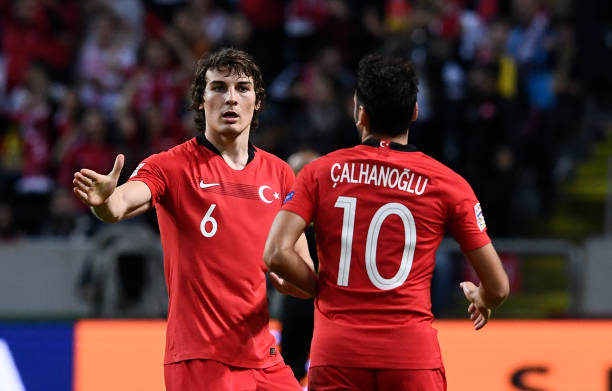
This article is part of the Guardian’s Euro 2020 Experts’ Network, a cooperation between some of the best media organisations from the 24 countries who qualified. theguardian.com is running previews from two countries each day in the run-up to the tournament kicking off on 11 June.
Caglar Soyuncu is among the most recognisable names in the Turkey national team. What is less well known is the impact he has had on the game in his home country.
Breaking with tradition, Soyuncu skipped moving to a major Super Lig club. He had the option when he was at Altinordu. “I had a choice,” he said. “An academy in the Super Lig or the regional amateur league? It was a tough decision but I decided to listen to the manager [Huseyin Eroglu] and the club president [Mehmet Seyit Ozkan] and play in the amateur leagues to gain experience.”
It was a decision that paid off as the chisel-jawed centre-back attracted interest in Germany, making a name for himself in the Bundesliga for Freiburg before a £20m move to Leicester City. In the process he turned Turkish football on its head. Soyuncu is not the first Turkish player to move to a top-five league but by doing so without having played in Turkey’s top tier he trailblazed a new path for other young Turkish footballers.
Traditionally, the aim in Turkey is to move to one of Besiktas, Fenerbahce, Galatasaray or Trabzonspor and land a bumper contract. The problem is that the Turkish football market is a bubble. Players are wildly overpaid for what they deliver. Despite being unable to compete with the top five European leagues or the Netherlands, Belgium and Portugal, the dominant Turkish clubs continue to pay players higher wages than sides who continually outperform them. It is a comfort zone. Players have little incentive to improve but are paid above the odds nevertheless.
Soyuncu marked the beginning of a new era and Altinordu were at the centre of it. The plucky little Izmir-based club embarked on a bold project to create a new path. Altinordu saw a gap in the market. Turkey has a huge population of youth footballers – the largest in the Uefa zone – who were largely ignored for decades.
Altinordu set out to build an academy geared to developing players to a standard high enough to attract clubs from major leagues. The club bought land across the Aegean region and Western Anatolia, set up hundreds of football schools and scouted towns and villages previously ignored. At the academy, foreign languages are taught, media training is given, sports psychologists, qualified coaches and analysts are on site. All of which is the norm at clubs in major leagues but definitely not standard fare in Turkey.
Soyuncu is a two-footed centre-back, with an impressive passing range and technical ability for a player in his position. Perhaps something he picked up playing as a striker. “When I played as a forward, Wayne Rooney was my idol, I was short at the time so I loved that a striker who was young and not tall managed to become a star,” he told TamSaha Magazine in 2016.
Only after moving to Buca and then Altinordu at youth level was he converted to a centre-back. “After becoming a defender, Carles Puyol became my hero. I loved his bravery, character and leadership.”
At Altinordu, Soyuncu was roommates with Cengiz Under. Who would have thought it? Two unknown kids at an unheard club in the lower tiers would go on to become the posterboys of Turkish football. When Freiberg signed Soyuncu in 2016 it barely made a ripple. No one in Turkey noticed. Even after playing two full seasons as a first-team defender in the Bundesliga he still went unnoticed.
And then he got his move to Leicester. A player who had never appeared in the Turkish top tier moved to a Premier League club for £20m. Now he had their attention. Soyuncu struggled for playing time in his first season but has gone from strength to strength since breaking into the side and is widely regarded as one of the best defenders in one of the strongest leagues in the world.
Turkish soap operas have garnered popularity abroad and Soyuncu’s story could quite easily be seen as a classic rags to riches tale. But in addition to being a real story, it has inspired a new generation of Turkish players to believe in themselves and follow his path.
When he was playing in the amateur leagues Soyuncu recalls a friend who went to Galatasaray’s academy instead. “He told me that if I play in the amateur leagues I’m nothing. You would have probably said he was right back then. But I had always told myself I was going to make it and never give up.”
When Soyuncu made his full international debut in 2016 only three players in the starting lineup played outside Turkey. In the 4-2 World Cup qualifying win over the Netherlands in March only two of the starting XI were Super Lig players, Ozan Tufan and Ugurcan Cakir, and it would not be a surprise to see them move to Europe either.
This is Turkey 2.0. A confident youthful crop of players who want to prove themselves on the biggest stage. They want to compete and follow in the footsteps of Soyuncu.
Turkey’s biggest weakness used to be at the back. The new national team is built on defence with Soyuncu as its rock. They cruised through qualifying, taking four points off the world champions, France. They conceded only three goals in the group stage, no other team let in fewer.
Soyuncu is the leader of this new-look Turkish side, on paper one of the strongest national teams Turkey has ever had. And the head coach, Senol Günes, knows a thing or two about knockout tournaments. He guided Turkey to third place in the 2002 World Cup.
Turkey could be dark horses. If they are successful, Soyuncu will play a major role. As the saying goes; attack wins you games, defence wins you championships.
Emre Sarigul writes for turkish-football.com.
Follow him on Twitter @Turkish_Futbol1.
For a tactical guide on Turkey click here.










